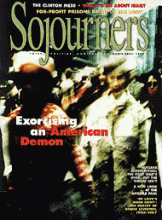During a funeral in 1992 gang members invaded a church in Boston, shot up the church sanctuary, and eventually stabbed a boy there nearly to death. Some ministers took this as a sign that if the faithful do not go out of the sanctuary to meet the needs of youth in the streets, then our young people would be coming inwith devastating consequences. A group of us took to the streets at night, and in helping drug dealers and gang youth created the National Ten Point Leadership Foundation.
The year we began our work, Boston experienced more than 150 homicides and 1,100 gunshot injuries. Dozens of youth crowded emergency rooms in hospitals every night, screaming in pain. By 1997, however, we experienced a 60 percent reduction in firearm incidents; the city had gone two-and-a-half years without a juvenile homicide.
On December 11 the peace ended when 16-year-old Eric Paulding was shot to death in the Franklin Field section of Dorchester. During the next 24 hours, Boston showed why it has become a national model for crime reduction: partnerships, communication, hard work, and prayer. In the hours following the shooting, we spoke to the mayor, the police commissioner, city and community agencies, and the private sector. All were ready to mobilize against the potential retaliation that loomed ominously. We joined the Paulding family in urging community calm. The police worked swiftly to isolate and pursue suspects. The Franklin Field youth center kept its doors open late into the night during the holiday season, and youth workers were on the street around the clock. Corporations committed themselves to investing capital in the neighborhoods.
Five years ago these actions would not have happened. The killing would have signaled a return to the "Wild West" in Boston. Instead, we struggle to turn this tragedy into a triumph, an opportunity for community healing, and a sign of communal determination to keep building.
Read the Full Article
